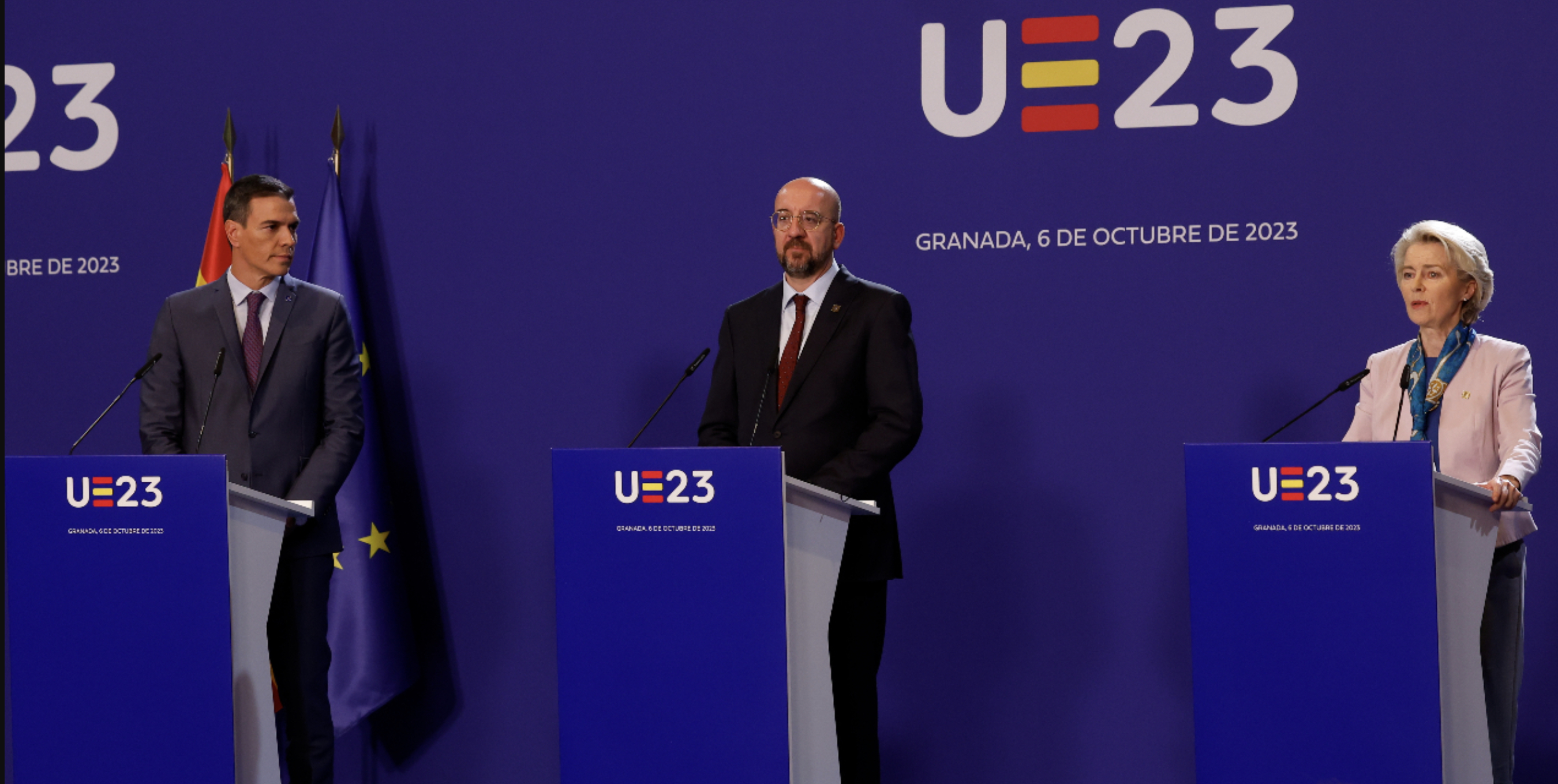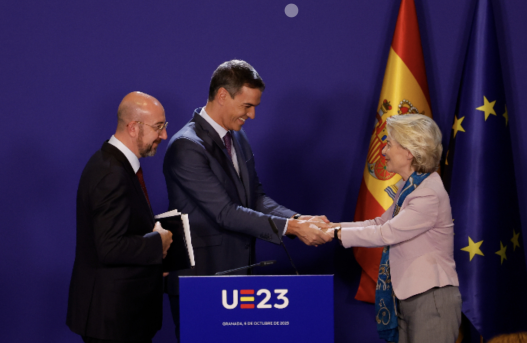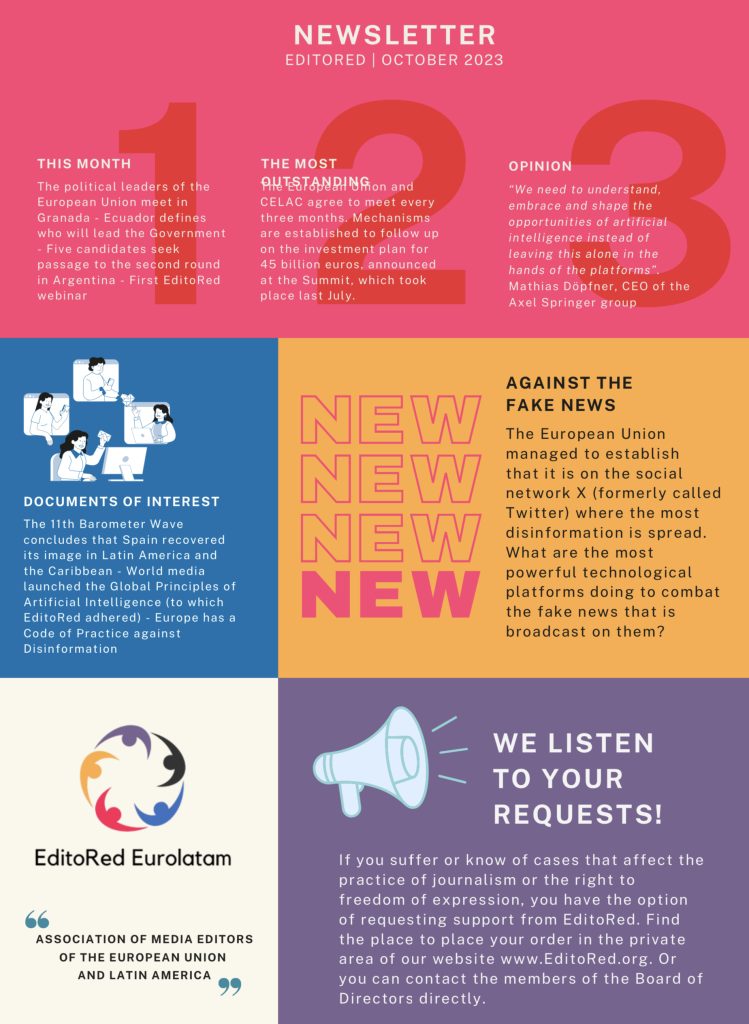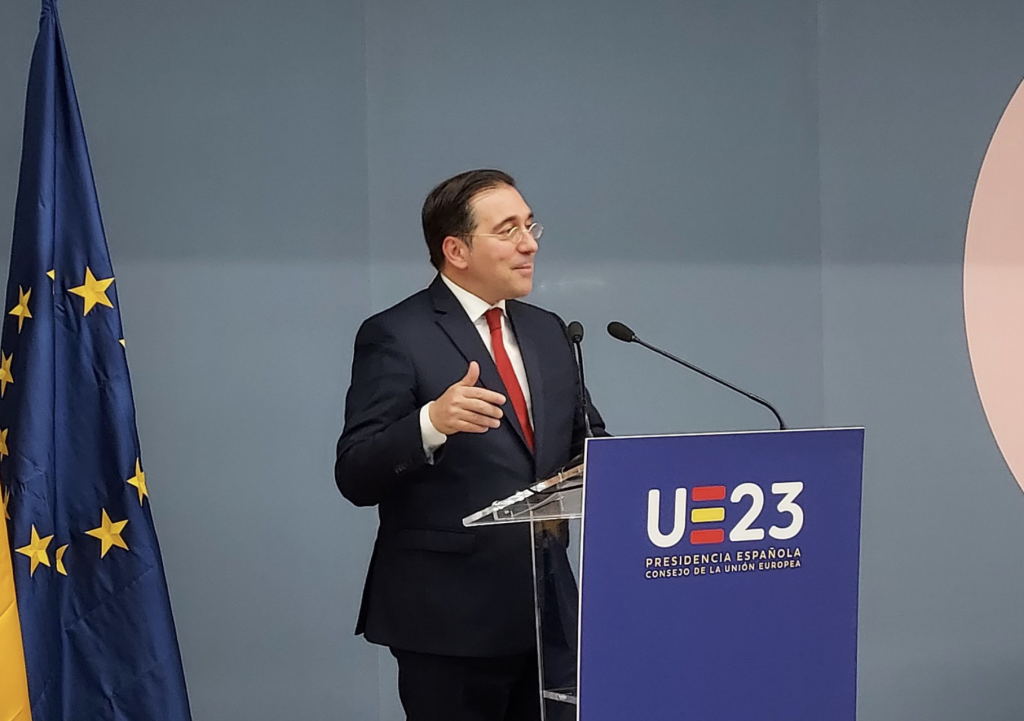
THE GRANADA DECLARATION ADDRESSES 'EU PRIORITIES' BUT AVOIDS ANY REFERENCE TO THE MIGRATION ISSUE
On October 6, 2023, the heads of state and government of the EU approved the so-called “Granada Declaration”.The aim of this framework document is to promote the debate on “the Union’s priorities for the coming years”, with special attention to the next Strategic Agenda and the future enlargement, but avoiding any mention of the migration issue in order to avoid the veto of Poland and Hungary.
“The name of Granada, and of Spain, will be forever linked to transcendental decisions for the future of Europe,” declared the acting Prime Minister, Pedro Sánchez, during the press conference following the informal European Council, which was also attended by the President of the European Council, Charles Michel, and the President of the European Commission, Ursula von der Leyen.
The meeting concluded with a Declaration of Granada whose objective, according to the text, is “to mark the beginning of the process of defining the general political orientations and priorities of the Union for the coming years, establishing a strategic line of action to shape our common future for the benefit of all”.
To this end, and taking into account the previous 2019 Strategic Agenda and the consequences of the pandemic and Russia’s war of aggression against Ukraine, which “have tested our resilience, highlighting the need for the Union to strengthen its sovereignty,” the 27 commit, on the basis of the Strategic Compass for Security and Defense, to strengthen their defense preparedness and invest in military capabilities by developing our technological and industrial base.
The Declaration also calls for enhancing long-term resilience and competitiveness by “ensuring that the EU has all the necessary tools to ensure sustainable and inclusive growth and global leadership in this crucial decade,” with a focus on green and digital transitions, energy and resource efficiency, circularity, decarbonization, resilience to natural disasters and adaptation to climate change.
The text also advocates “a more cohesive single market” and calls for ensuring “access to affordable energy”, increasing energy sovereignty and reducing “external dependencies in other key areas where the EU needs to develop a sufficient level of capacity to ensure its economic and social well-being, such as digital and net-zero emission technologies, medicines and essential raw materials”, among others. “We will strengthen our position as an industrial, technological and commercial power, putting special focus on high value-added areas where we already have a competitive advantage or can become leaders,” he continues.
Expansion
The other major chapter of the Declaration is EU enlargement, “a geostrategic investment in peace, security, stability and prosperity”. “Spain joined the then European Economic Community in the mid-1980s, how can we oppose other countries that have been knocking on the door for years to join the EU?” said Pedro Sánchez during the press conference.
“In view of the prospect of an enlarged Union, both the EU and the future Member States must be prepared,” the Declaration warns. Therefore, “aspiring members should intensify their reform efforts, in particular in the area of the rule of law, in line with the merit-based nature of the accession process and with the assistance of the EU,” it continues.
“In parallel, the Union must lay the foundations and necessary internal reforms”, setting “our long-term ambitions and ways to achieve them” and addressing “key issues related to our priorities and policies, as well as our capacity to act”. “The European Council will continue discussions on the future priorities of our Union in the coming months, ahead of the adoption of the Strategic Agenda next year,” the Declaration concludes.
The text does not include any date for the extension, not even the year 2030, which had been considered for this purpose. “The Declaration does not set a date and never was set a date, and it’s best that we don’t set dates,” warned Charles Michel. “Accession will be carried out on the merits of each, and the only purpose of setting dates is to serve as a spur for States to be prepared,” he added.
For her part, Ursula von der Leyen warned that, in any case, the accession process of the candidate countries will be based “on the merits” of each candidate country. “There will be no coffee for all or shortcuts, the progress of each one will be analyzed on the basis of the Copenhagen criteria,” he insisted.
Migration
The text does not include a single word on the issue of migration, one of the main priorities of the Spanish Presidency of the EU and only two days after the Committee of Permanent Representatives (Coreper) to the EU decided in Brussels that there is a sufficient majority to establish a common position on the Crisis Regulation, the last stumbling block for the resumption of negotiations on the Pact on Migration and Asylum before the end of the Spanish Presidency.
In fact, the reference to the migration issue was closed yesterday with an accompanying statement by Charles Michel in which he said that “migration is a European challenge that requires a European response”. “We will pursue a comprehensive approach to migration combining enhanced external action, comprehensive mutually beneficial partnerships with countries of origin and transit, addressing the root causes of migration, opportunities for legal migration, more effective protection of the EU’s external borders, a determined fight against organized crime, trafficking and smuggling of human beings, the instrumentalization of migration as a hybrid threat, intensified returns and internal aspects, in accordance with international law, EU principles and values and the protection of fundamental rights,” the text concludes.
The Granada Declaration was originally to include a point advocating a “comprehensive approach” combining “mutually beneficial” agreements with countries of origin and transit, increased “opportunities for legal immigration”, improved protection of external borders and accelerated returns of irregular migrants. However, it all came to nothing due to the opposition of the Hungarian and Polish governments.
“I am the Prime Minister of the Republic of Poland. I am responsible for the security of Poland and its citizens. Therefore, as a responsible politician, I officially reject the whole paragraph of the summit conclusions on migration,” Polish Prime Minister Mateusz Morawiecki had written on his X account. “There is no chance to have any kind of agreement on migration. Politically it is impossible: not only today, but in general, in the coming years,” Hungarian Prime Minister Viktor Orban declared.
In any case, Michel was relatively optimistic at the press conference: “For years there had been no progress and, fortunately, within the Spanish Presidency we have made some progress in the positions and at least an agreement has been reached,” he said, referring to Coreper’s decision.
By Eduardo González, journalist of The Diplomat in Spain



